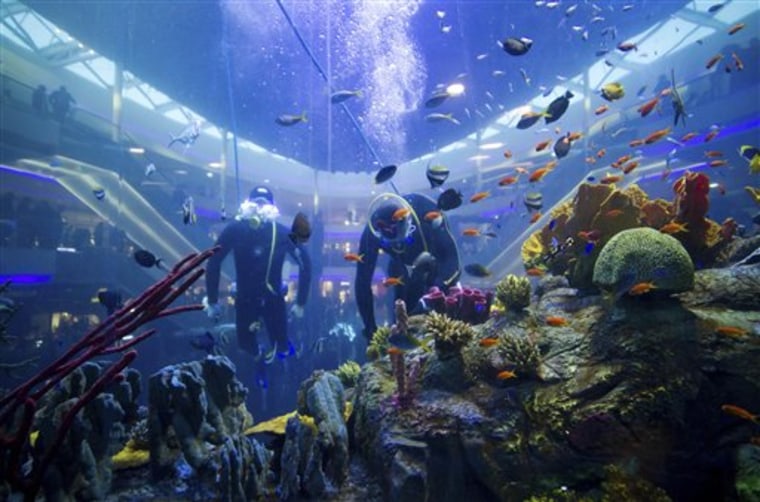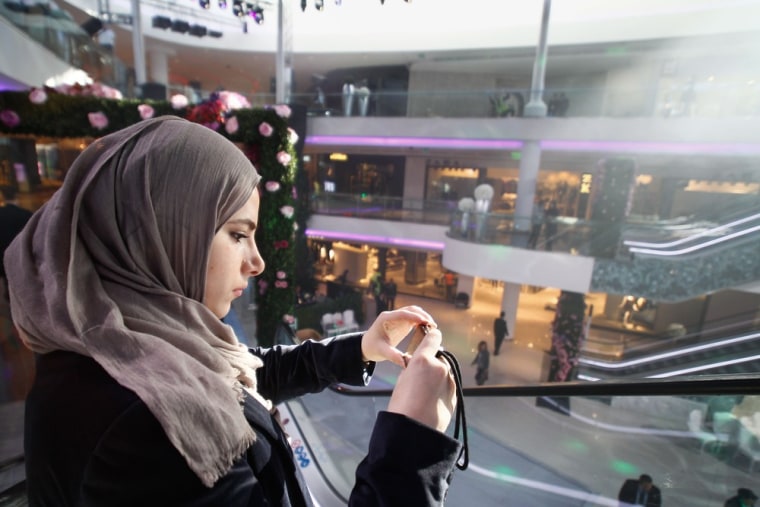Inaugurated by pop star Jennifer Lopez in front of the cream of Moroccan society, Casablanca's first mega mall, complete with two-story-high aquarium, is dripping with glamour and luxury.
While developers describe it as a step bringing Morocco closer to the ranks of the developed world, detractors worry that it is a vanity project that a country teetering on the edge of an economic crisis can ill afford.
Morocco at first seems a curious choice for what its developers are billing as the biggest mall in Africa. It already has world-renowned traditional bazaars featuring exquisite ceramics and rugs that draw tourists from across the globe.
The North African kingdom of 32 million is home to the largest income inequalities in the Arab world — and now hosts Louis Vuitton, Gucci, Dior and Ralph Lauren boutiques and department store Galeries Lafayette in the new mall, a futuristic, bulbous silver structure perched on Morocco's coast overlooking the crashing waves of the Atlantic.
It is a stark symbol of the contrasts of a country with 8.5 million people in poverty that ranks 130 out of 186 on the U.N.'s human development index, but will still host acts like Shakira and Kanye West for a summer concert series.
'A great honor'
The 20-minute coastal drive from downtown Casablanca — Morocco's largest city — to the mall showcases the complexity of the country, with slums hidden from sight by high walls, construction areas for new shopping centers and finally the villas and night clubs of the wealthy.
"It is a great honor for Morocco to have a project of such dimensions," said Salwa Akhannouch, head of the Aksal group and the driving force behind the mall, at its opening this month.
Most Moroccans will not be shopping at the mall.
The country has some of the lowest literacy and highest unemployment rates and the highest income disparity in the Middle East and North Africa, according to the Gini coefficient, a statistical tool used by economists to measure the inequality of distribution in a country. The disparity has been growing every year.
Crowds packed the mall in the weeks after it opened, ambling through sunlit galleries and gazing at the aquarium and the 350 stores on offer. Periodically, colorfully dressed performers, some from as far away as Eastern Europe, would burst into enthusiastic dance routines to the accompaniment of loud drums.
There were few shopping bags in sight, however, and most seemed just curious to finally see this much-talked-about monument to shopping that has been four years and $260 million in the making.
"There is a big gulf between the rich and the poor and the rich just seem to be getting richer and the poor, poorer —the mall is a symbol of that," said Hassan Ali, a 45-year-old shopkeeper selling handtooled leather jackets in Casablanca's modest old quarter.
Aspiring middle class
Tourism is a vital part of the mall's plan, according to its secretary general, Jenane Laghrar, who anticipates 20 percent of its estimated 12 million annual visitors will come from abroad. She said sales for the first week were on target.
"When you enter the mall, you see Gucci and Dior, but don't forget you have the largest content in Africa — at the same time you have more affordable brands," she said.
There is also an aspiring middle class that wants to be able to buy these luxury products, she added.
The hope is also that European tourists will add to their usual itinerary of beaches and the exotic cities of Fez and Marrakech, a trip to Casablanca — and the mall.

Laghrar said they are especially hoping to attract visitors from the rest of Africa who pass through Casablanca airport on their way to Europe.
For now, however, visitors from Africa make up less than 5 percent of Morocco's tourists, with the vast majority still from Europe.
This could well be a problem as the European continent sinks into crisis, said economist Najib Akesbi, and in fact Europe's woes pose a dilemma for the Moroccan economy as a whole, which is deeply intertwined with its neighbors across the Mediterranean.
Morocco's main sources of hard currency, including foreign investment, tourism and remittances from its workers abroad, overwhelmingly come from Europe. On Dec. 20, the government reduced growth projections for 2012 by half a percentage point in response to Europe's crisis.
While Europe falters, the wealthy oil states of the Gulf are playing a role in building a more consumerist Morocco.
Half the funding for the Morocco mall comes from the Saudi Al-Jedaie Group which has built malls across Saudi Arabia and two new initiatives looks set to shower Morocco with Gulf money.
